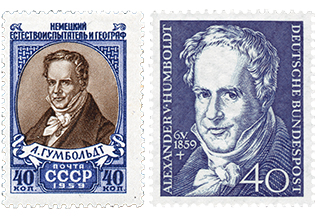News | Wednesday, 24 April 2019
Do we need a Humboldtian esprit in order to understand the world properly?
Festive symposium on the occasion of the Humboldt-Year 2019

Foto: Briefmarken der UdSSR-Post und der Deutschen Bundespost zu Alexander von Humboldts (Wikimedia Commons / Notafly / NobbiP)
Alexander von Humboldt’s influence on philosophy and science was enormous. His extensive research trips provided insights into some of the world’s most unknown regions. The expedition in the Russian Empire took him in 1829 from St Petersburg to the Ural and Altai Mountains, to the border with China, to Central Asia, to the Caspian Sea and along the river Volga. His journey will be discussed by the festive symposium “The Power of Science in Times of Change”. The event takes place on Thursday, May 14, 2019, in Berlin.
The event seeks to build a bridge between the historic and contemporary exploration of Eurasia and Central Asia. Various lectures will highlight current research topics along the historical route Humboldt’s Russian Expedition. Subsequently, experts will discuss the situation and perspectives for the science systems of Germany, Russia and Central Asia: Can we find a heritage of Humboldt’s Esprit in today’s science? How does science convey its expertise to the public? How can higher education, research and innovation shape the development of a country or region? What factual and soft power does science have?
Alexander von Humboldt, born on 14 September 1769 in Berlin, was one of those scholars able to establish connections between the movements of the stars in space and the smallest known structures of life, whether terrestrial or underground. He acquired the expertise for his unique understanding of nature at universities and academies in Germany and abroad, but above all, through lifelong learning, constant research and exchange with the greatest scientists of his time.

